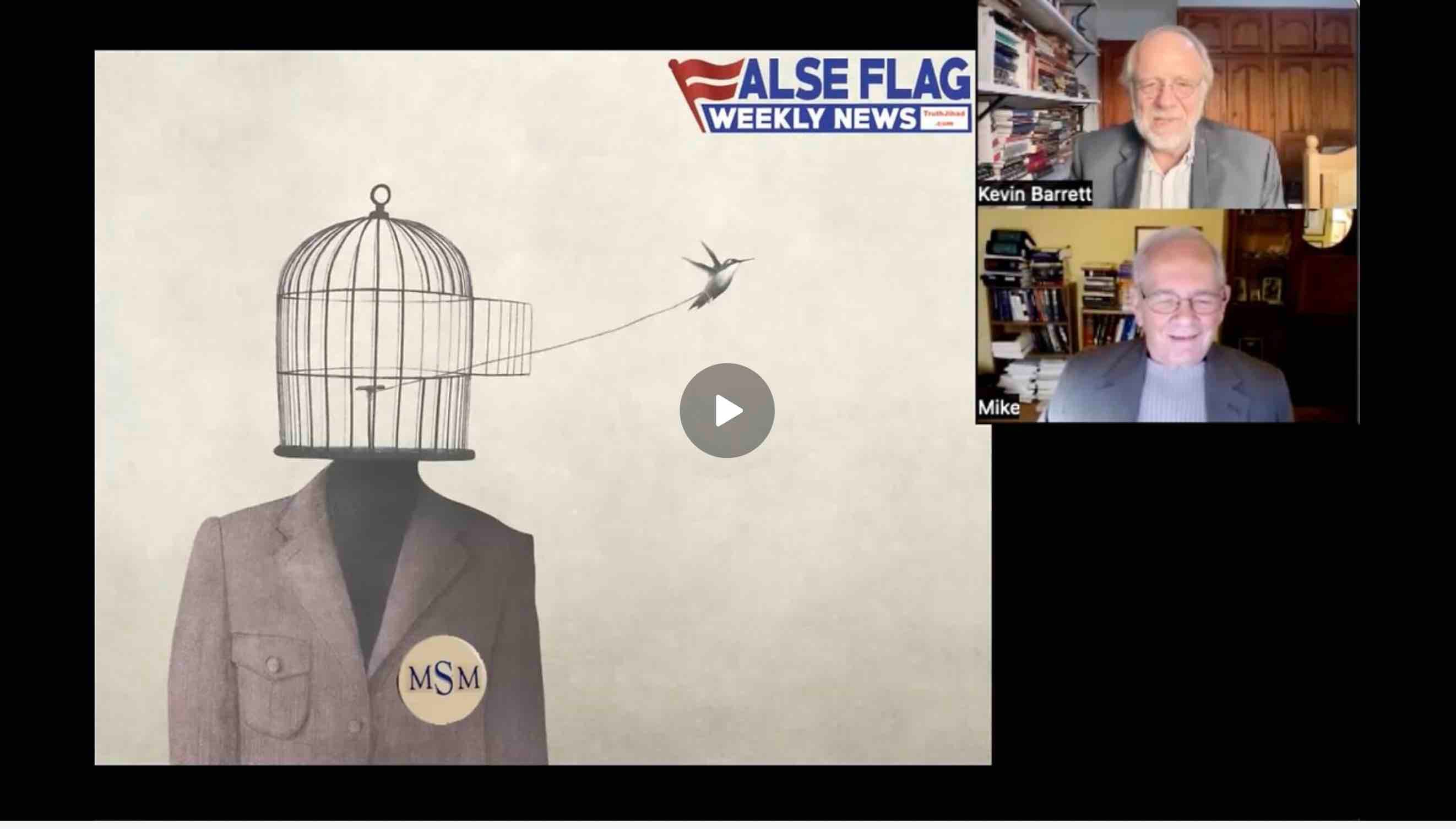
Rumble link Bitchute link
This week’s False Flag Weekly News begins with the Daily Wire article “Harvard Employee Harasses Jewish Student Suing School For Anti-Semitism - Asks To Debate 9/11 Conspiracies.” The implication is that it is “harassment” to ask someone to “debate 9/11 conspiracies.” Especially if that someone is Jewish. And even more especially if they are suing their school for alleged anti-Semitism.
The Daily Wire hit piece targets Gustavo Espada, the financial and systems coordinator for Harvard’s Department of East Asian Languages and Civilizations. According to the Wire, Espada “has been active in pushing 9/11 conspiracy theories for 18 years, according to a 2006 piece in The Lowell Sun which reported he spends 10 hours a week ‘handing out literature,’ Web logging and talking with people on the street about his views on 9/11.”
The thrust of the Wire hit piece is that Espada should be fired from his university job because he wants to debate 9/11. Reading the story brought back memories of a my own experience in 2006. While teaching subjects including Folklore, African Studies, and Islamic Studies at the University of Wisconsin-Madison, I had begun doing 9/11 teach-ins on campus in 2004, and then gotten involved in the national and global 9/11 truth movements. In 2006 I became the focus of a concerted pushback campaign sparked by Lynn Cheney’s group ACTA and its acolytes in the Wisconsin Republican Party.
Like Espada, I repeatedly challenged my detractors to meet me in a formal debate. In September 2006, while I was under fire from the State Legislature, the UW-Madison Debate Club sponsored what was supposed to be a debate on 9/11. They arranged for me and Jim Fetzer to argue against the 9/11 Commission’s official story, and told us that a history professor and a political science professor (Donald Downs, as I recall) had agreed to defend it. But at the last minute, the two pro-official-story professors backed out. So Jim Fetzer and I were left “debating” two empty chairs.
I reiterated my debate challenge. The university Provost, Patrick Farrell, told me that he would try to have the university set up some sort of formal panel discussion or debate after the media furor died down. Student newspapers at UW-Madison and UW-Oshkosh published op-eds plaintively begging for some knowledgable professor to debate and refute me. But nobody stepped forward to defend the 9/11 Commission.
Six months of media hoopla (July through December 2006) made me unemployable at the University of Wisconsin. I was denied a tenure-track Islam-Humanities job at U.W.-Whitewater purely due to my views of 9/11, according to whistleblowing then-Dean of Humanities Howard Ross. And I was told by the late Professor Muhammad Umar Memon, then a member of the UW-Madison hiring committee for its Islam classes, that the committee was informed by the University administration that I must not be rehired for my Islam 101 teaching job for the same reason.
Rendered unemployable due to my views of 9/11, but with nobody willing to debate me and explain why my views were wrong (privately most of my colleagues I knew personally thought my views were likely right or at least plausible) I offered a $1000 honorarium to any University of Wisconsin instructor, whether professor or TA, who was willing to defend the 9/11 Commission in a formal debate. There were no takers. Years later, the offer was raised to $2000. Still no takers.
Similar debate challenges were issued at other universities. A 9/11 truth group at the University of Michigan sent letters to every professor in the Engineering department seeking someone to defend the FEMA and NIST positions on the destruction of the World Trade Center in a debate with me and Underwriters Labs whistleblower Kevin Ryan. Most didn’t respond. The few who did told the organizers, off the record, that Ryan and I were right.
Could a 9/11 Debate Have Prevented Genocide?
According to the tenets of liberal democracy, all important matters are supposed to be debated on the basis of logic and evidence, and the truth that emerges becomes the touchstone of public policy. Had a real debate on 9/11 ever transpired, the truth that would have emerged—9/11 was orchestrated not by al-Qaeda, but by the state of Israel and its American neoconservative allies—would have prevented the series of wars that has devastated the Middle East, including the ongoing Israeli genocide of Gaza.
People resist debate when they know that logic and facts are not on their side. When would-be debaters like Espada are smeared, and their livelihoods threatened, it’s obvious that those doing the smearing know that their victims are right.
Can We Debate the Ukraine War?
Another topic that’s off-limits to debate is the US war on Russia through Ukraine. As with 9/11, the neoconservative propaganda talking points—the enemy is pure evil, “they” attacked “us” for no reason, and so on—are inflated to the status of sacred public myths, and anyone who wants to debate them is a damnable heretic. Merely for exposing us to Putin’s point of view, Tucker Carlson has been attacked by the whole mainstream media. As with 9/11, the neocon Establishment’s refusal to debate on logic and evidence, and its preference for shrill vituperation and ad-hominem attacks, suggests that it knows it couldn’t win a real debate with the likes of Putin.
Cancelled Candidates
Elections are a form of public policy debate. When the side with power knows that it can’t win a fair debate—as with the Pakistani military’s stand-off with Imran Khan—it may try to cancel the candidacy…or the candidate. Khan, who was very nearly assassinated by the Pakistani establishment, currently languishes in prison despite his overwhelming popularity among the vast majority of his countrymen. The Pakistani junta’s attempt to rig last week’s elections failed, because it’s impossible to convincingly rig an election when your opponent has such high levels of support. So the man who is the people’s choice and the rightful Prime Minister, targeted by ludicrous legal assaults including an attack on the legitimacy of his marriage, remains in prison…for now.
Imran Khan’s plight, we might imagine, is typical of tinpot third world military dictatorships, but irrelevant to the affairs of advanced Western democracies. But in both the US and Germany, pro-immigration Establishments are working overtime to keep anti-immigration parties and personalities off the ballot. Like the Pakistani Establishment vis-a-vis Imran Khan, the US and German Establishments don’t want to have to debate anti-immigration populist movements. So the Democrats in the US, and the ruling elites in Germany, are using various underhanded means to try to keep Trump and the MAGA movement, and the anti-immigration party AFD, off the two nations’ respective ballots.
Donald Trump, like Imran Khan, might very well end up winning an election from a prison cell. Like Khan, Trump has been targeted by a lawfare campaign expressly designed to torpedo his political chances. And Trump’s party, like Khan’s, views itself as the victim of widespread election fraud, and those who try to raise and debate the issue are deplatformed. Though the two cases aren’t fully comparable—Khan is overwhelmingly popular while Trump is controversial, Khan’s complaints are fully justified while Trump’s are only partly so, and Khan is completely honest and ethical while Trump is not—there are enough similarities to raise questions about whether American “democracy” is any healthier than Pakistan’s.
Undebatable COVID
The notion that the truth emerges through free and fair debate took a huge hit during COVID. We were told to “trust the science” and wear masks everywhere, even though the science suggests that there is no convincing evidence that masks significantly slow the spread of respiratory viruses. The debate about COVID origins was unceremoniously quashed, and people were deplatformed for even mentioning the issue. And arguments about whether highly experimental vaccines should be mass-tested on entire populations were likewise suppressed. Only one position—the Establishment’s—was allowed.
One More Question for Debate
So in light of all the signs that liberal democracy is dead and free and fair debate no longer effectively exists, I propose one last subject for debate: Should debate itself be legal? Or to rephrase that in debate-ese: “Resolved: Debate should be criminalized, and would-be debaters should be imprisoned or executed.”
Especially if they are “anti-Semitic.”
This is a public episode. If you’d like to discuss this with other subscribers or get access to bonus episodes, visit kevinbarrett.substack.com/subscribe
More Episodes
 2024-02-18
2024-02-18
 2024-02-04
2024-02-04
 2024-02-03
2024-02-03
 2024-01-28
2024-01-28
 2024-01-13
2024-01-13
Create your
podcast in
minutes
- Full-featured podcast site
- Unlimited storage and bandwidth
- Comprehensive podcast stats
- Distribute to Apple Podcasts, Spotify, and more
- Make money with your podcast
It is Free
- Privacy Policy
- Cookie Policy
- Terms of Use
- Consent Preferences
- Copyright © 2015-2024 Podbean.com






